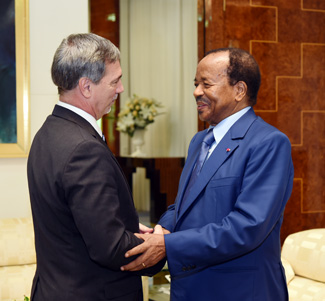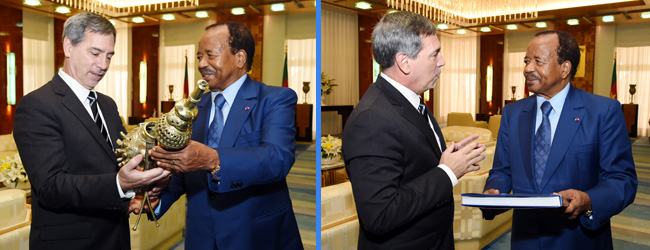7, September 2017
Battle of the Presidents: Biya expected to take on the Southern Cameroons leader in Far North visit 0
President Biya is planning a campaign visit to the Far North region in which he is expected to attack the interim leader of the Southern Cameroons Governing Council, Cameroon Concord News has learned from reliable sources in Yaounde. Our informants have also hinted that Etoudi intends to package the tour to appear as if the 85 year old leader’s trip to Maroua is to boost the morale of the joint Anglophone and Francophone troops combating the Nigerian Islamic sect, Boko Haram.
The date of the presidential visit has not yet been made public. However, a well-placed source who spoke to our correspondent in Yaounde said the visit may be staged in the month of October 2017. A lot of tongues have been wagging against Mr. Biya who has never been to this region three years after he declared the war against Boko Haram.
Biya is reportedly fighting for his political survival and travelling to the Far North region will provide him with a rare opportunity of signing a new pack with the huge electoral bastion in the region. With support for his party and leadership style facing a catastrophic decline in Southern Cameroons, the Maroua trip is aimed at convincing the French government of President Macron that he remains the right man for the job.
By Rita Akana
Cameroon Concord News



































7, September 2017
Al Jazeera: Linguistic tensions boil over in Cameroon 0
Thousands of students, shopkeepers and staff in Cameroon have protested this week against what they claim is the marginalisation of the country’s English-speaking minority population. The so-called ghost-town protests in the Anglophone regions of Cameroon, including the city of Bamenda in the north and the town of Buea in the southwest, which led to the closure of schools, shops and market stalls, are the latest in a series of actions launched in November 2016.
Initiated by teachers and lawyers, the protests have revolved around encouraging people to use absenteeism to challenge what many English-speaking citizens claim is the dominance of French in society. Thousands of students stayed away as schools resumed this week. Petrol stations and shops were also empty.
Many protesters called for full linguistic representation in schools, courts and in the government. Cameroon’s English-speaking citizens make up around 20 percent of the nation’s total population of almost 24 million. The rest of the country speaks French, which is the language of use for government business.
Activists in the Southwest Region of Ambazonia told Al Jazeera that a mass skipping of the first day of school – Monday, September 4 – was a success. “Some people think that parents are not sending their kids to school because of the militarisation of these two regions, but that’s not the case,” said a participant who wanted to remain anonymous.
“How do you want kids to go back to a system that we are protesting against, the system that we want cleaned? It’s a peaceful protest.” On Monday, pro-government newspapers, the Cameroon Tribune and L’essentiel du Cameroun, published front-page stories showing children attending school as normal.
Security forces were also deployed in the affected areas at the start of the week to ensure there was no repeat of last year’s violent protests which witnessed the use of live ammunition and tear gas by state security forces. Since protests began last year, the government has frequently cracked down on disorder in the Anglophone regions of the country.
President Paul Biya, in power for 35 years, ordered a series of arrests and shut down internet access for three months. Security forces have killed at least six people to date and arrested hundreds more. Last Friday, President Biya ordered the release of dozens of political activists in a move seen as an attempt to ease tensions. The UN has called for both sides to engage in constructive dialogue.
Source: Al Jazeera